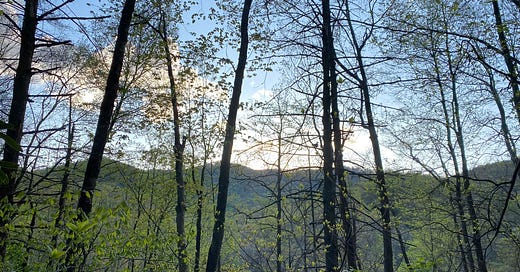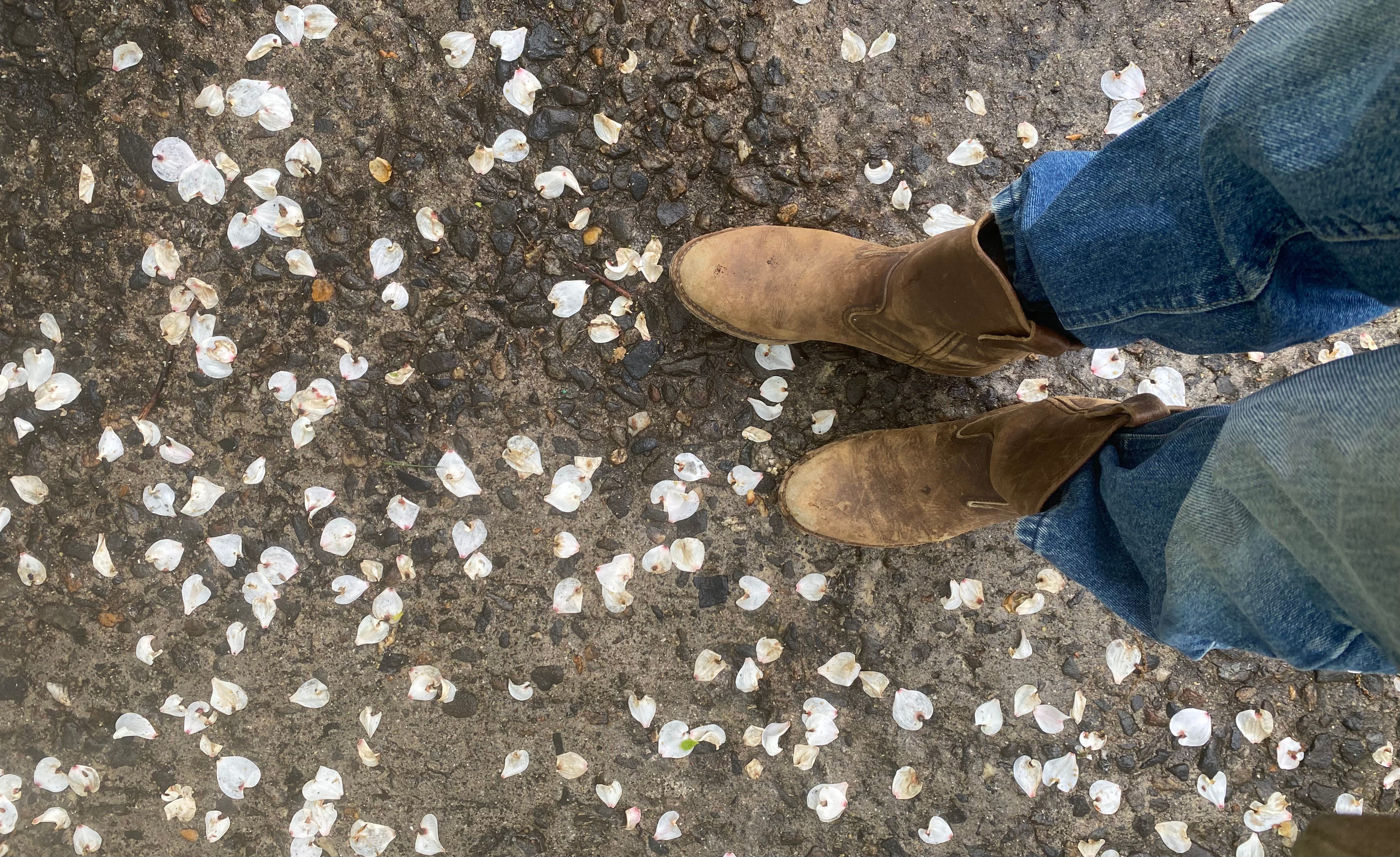Growing up in the Smokey Mountains, it was always beautiful watching the slow green-stepped march of trees up the mountainsides. Even now, the Balsam Mountains are still bald at the top, with no thick curl of frizzy green sprouting out yet. But, inch by inch, a lush pallet of green is washing over the forest.
Yesterday I visited my hometown, stopping to see Judaculla Rock. Judaculla is, in Cherokee lore, “The Slant-Eyed Master of Game.” A giant who dwelled high in the mountains, with a large cave as his private dancing chamber and a high stone seat as his lookout. From his throne of rock, he watched the mountains and protected the boundary lands of hunting grounds. When hunters wandered into his territory, he leaped from his seat and landed before them with such force his seven-fingered handprint was left in the soapstone rock he fell upon.
Judaculla Rock has a carving of the seven-fingered hand, as well as extensive divots and curves, carvings of figures and cyclical symbols. Some archeologists suspect it is a carved map, a depiction of the features and boundaries of the hunting territory.
Judaculla’s throne seat is now called “Devil’s Courthouse.” A terrible name for a stunning place. And colonists dubbed it that because the devil was said to hold court in Judaculla’s cave. Which seems to me a pretty obvious correlation between a place of native myth and spiritual significance and colonial abhorrence of mysticism, animism, and sacred sites.
Afterward, walking a favorite trail to a waterfall deep in the mountains, I thought out loud, “Being in these mountains comes with a sort of sadness. Because I look around and see it’d be better off if we were never here.”
I don’t know if the “we” I meant were white colonizers or human beings entirely. But this peculiar sadness isn’t a very useful one, but maybe it’s another very problematic and colonial line of thinking to believe everything must have “use.”
It’s unuseful because I always slip into a semi-nihilistic and whiny line of thinking, afterward. “Well,” I reason, “I didn’t wish to be born in this place, in this lifetime. In fact, I didn’t wish to be born at all.”
Driving the curved roads I see people fishing for trout in creeks, stocked by the government because each creek is dammed at least twice over. There was a heavy thunderstorm yesterday morning, and I excitedly wondered how full the falls would be—before deflating, remembering that there’s a dam above it, and the waterfall is just an outflow. There’d be no change. We’ve reshaped water and put borders around the earth’s natural rhythms.
That nihilistic thought usually leads one of two ways—the first trail being, “I didn’t ask for this, I didn’t do this, so this is not my fault.” It’s a nice, easy way to give yourself comfort again. It’s a snug little closed box of thought, dismissing accountability and removing any pressure to change.
The second trail of logic is, “Well, I didn’t ask for this life, or for this maimed world. But I’m here now. So what can I do?”
There are so many ways to be of service, to help heal the world. I used to think my best way to help was to be an environmental journalist. To help the world with words. My current ambition is to become a therapist, to help individual people. I pray that life will merge writing and therapy for me, to offer up all of my skills to the planet.
But beneath all of that, a more primal need is to be in communion with the land. And that is undoubtedly an act of service. To feel connected with the planet and its motions, the earth that surrounds you and the land that you’ve come from. It takes slowness, a recognition that not all good things come upon request.
I did not ask to be born in these mountains, in this Cherokee land that shouldn’t be mine. But perhaps I can still be a good steward. This excerpt from Wendell Berry’s “Manifesto: The Mad Farmer Liberation Front” sticks out in my mind:
Say that your main crop is the forest
that you did not plant,
that you will not live to harvest.
Say that the leaves are harvested
when they have rotted into the mold.
Call that profit. Prophesy such returns.
Put your faith in the two inches of humus
that will build under the trees
every thousand years.
The dogwood petals are falling, a sign that most of spring is past us. And my psyche is wriggling, restless amidst all of this growth. I am honing my skills, my therapeutic knowledge, my craft with words, and my patience with slow-growing things. I want to invest myself in these areas of deep meaning and connection. But all of this good takes time.






